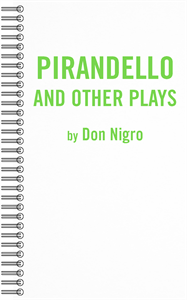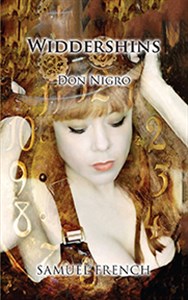
Pirandello (Nigro)
- Short Play, Dark Comedy
- 3M, 4F
- ISBN: SFNY-12419
This complex investigation into the relationship of propaganda and art to reality and the horrific mortal consequences that can result is a darkly funny, surreal, thought provoking, and distorted funhouse mirror image of later events in America.
More information
Description
- Short Play
- Dark Comedy
- Target Audience: Teen (Age 14 - 18), Adult
In this longer one act, the great Italian playwright Luigi Pirandello, master of plays which subvert our sense of what’s real, and make us question our ability to ever know the truth, is writing alone late at night on the stage of his theatre when he’s interrupted by Il Duce (the Italian dictator Mussolini) who has come to offer him the privilege of writing the authorized play about the dictator’s life.
Pirandello tries to explain as tactfully as possible that he mostly writes plays about the elusive nature of reality, but Il Duce mixes charm and humor with chilling threats to try and get what he wants, and in the course of their encounter more people from Pirandello’s life keep mysteriously showing up—Pirandello’s irate and perhaps unbalanced wife, who is maniacally jealous and accuses him of sleeping with every woman in sight, including his daughter; the actress with whom Pirandello is deeply and hopelessly in love, who was once rejected by him and now torments him; Pirandello’s father-in-law, who keeps trying to challenge him to a duel but can’t find the salad forks; Il Duce’s mistress, who has been having a very odd dream about being hung upside down and shot, and Pirandello’s daughter herself, from whom Il Duce is determined to unravel the mystery of what, if anything, Pirandello is guilty of, and the situation comes more and more to resemble the labyrinth of ambiguous realities he has explored in his plays.
Pirandello has been a supporter of the Fascist Mussolini in order to get money for his theatre, and now Il Duce turns the arguments in his plays back on him to justify his own Fascist propaganda, since if, as Pirandello suggests in his plays, anything can be so if you think it’s so, then it’s perfectly legitimate for a ruthless leader to mold the reality of his subjects by lying to them over and over until his lies become truth to them. Pirandello is forced to examine his own complicity in bringing this brutal, lying sociopath and ally of Hitler to power.
This complex investigation into the relationship of propaganda and art to reality and the horrific mortal consequences that can result is a darkly funny, surreal, thought provoking, and distorted funhouse mirror image of later events in America. One of a group of Nigro’s plays on Italian subjects, some other volumes of which include Machiavelli, Mariner, Paganini, Eleanora Duse Dies In Pittsburgh, Botticelli Venus, and Anarchy.
Pirandello tries to explain as tactfully as possible that he mostly writes plays about the elusive nature of reality, but Il Duce mixes charm and humor with chilling threats to try and get what he wants, and in the course of their encounter more people from Pirandello’s life keep mysteriously showing up—Pirandello’s irate and perhaps unbalanced wife, who is maniacally jealous and accuses him of sleeping with every woman in sight, including his daughter; the actress with whom Pirandello is deeply and hopelessly in love, who was once rejected by him and now torments him; Pirandello’s father-in-law, who keeps trying to challenge him to a duel but can’t find the salad forks; Il Duce’s mistress, who has been having a very odd dream about being hung upside down and shot, and Pirandello’s daughter herself, from whom Il Duce is determined to unravel the mystery of what, if anything, Pirandello is guilty of, and the situation comes more and more to resemble the labyrinth of ambiguous realities he has explored in his plays.
Pirandello has been a supporter of the Fascist Mussolini in order to get money for his theatre, and now Il Duce turns the arguments in his plays back on him to justify his own Fascist propaganda, since if, as Pirandello suggests in his plays, anything can be so if you think it’s so, then it’s perfectly legitimate for a ruthless leader to mold the reality of his subjects by lying to them over and over until his lies become truth to them. Pirandello is forced to examine his own complicity in bringing this brutal, lying sociopath and ally of Hitler to power.
This complex investigation into the relationship of propaganda and art to reality and the horrific mortal consequences that can result is a darkly funny, surreal, thought provoking, and distorted funhouse mirror image of later events in America. One of a group of Nigro’s plays on Italian subjects, some other volumes of which include Machiavelli, Mariner, Paganini, Eleanora Duse Dies In Pittsburgh, Botticelli Venus, and Anarchy.
Characters
- Casting: 3M, 4F



